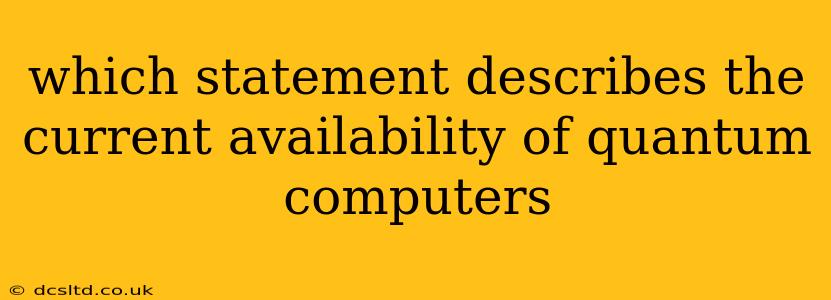Which Statement Describes the Current Availability of Quantum Computers?
Quantum computing is no longer a purely theoretical concept; however, its availability is far from widespread. The statement that best describes the current situation is that quantum computers are available, but they are highly specialized, limited in scale, and primarily accessible to researchers and large corporations through cloud-based platforms.
Let's break this down further, addressing some common questions and misconceptions surrounding quantum computer access:
Are Quantum Computers Available to the Public?
No, not in the way a personal computer or even a powerful supercomputer is available. While some companies offer cloud access to their quantum computers, this access is typically limited to specific research projects or development initiatives. The technology is still in its very early stages of development, and the machines themselves are incredibly complex, expensive, and require specialized expertise to operate and maintain. Think of it like the early days of the internet—powerful technology existed, but access was restricted to a select few.
What Kind of Access is Currently Available?
Currently, access to quantum computers primarily comes through cloud-based platforms. Companies like IBM, Google, and IonQ offer limited access to their quantum computers via their cloud services. These platforms often have waiting lists, require users to be vetted, and may limit the usage time or resources available. This cloud-based approach allows researchers and developers to experiment with quantum algorithms and applications without needing to own and operate a physical quantum computer.
What are the Limitations of Current Quantum Computers?
Current quantum computers face several significant limitations:
- Qubit Count: The number of qubits (quantum bits) is relatively low compared to the scale needed for many practical applications. More qubits are crucial for solving more complex problems.
- Error Rates: Quantum computers are prone to errors, often referred to as decoherence. The higher the number of qubits, the more challenging it becomes to maintain the delicate quantum states needed for computation.
- Cost and Complexity: Building and maintaining a quantum computer is extraordinarily expensive and requires highly specialized expertise. This high barrier to entry restricts access to large organizations and well-funded research institutions.
- Application Specificity: Currently, quantum computers are better suited for specific types of problems, such as those involving quantum simulations or optimization algorithms. They are not general-purpose computers that can replace classical computers for everyday tasks.
When Will Quantum Computers Be More Widely Available?
Predicting the widespread availability of quantum computers is difficult. The technology is rapidly evolving, but significant breakthroughs are still needed to overcome the limitations mentioned above. Experts suggest it could be several years or even decades before quantum computers become commonplace, comparable to the ubiquity of classical computers today. However, the gradual increase in qubit numbers and improvement in error correction techniques promise a path towards a future with more accessible quantum computing capabilities.
In conclusion, while quantum computers exist and are accessible to a select group through cloud platforms, their widespread availability remains a future prospect. The technology is still in its infancy, and significant hurdles regarding scalability, error rates, and cost must be overcome before they become more readily available to a broader audience.
